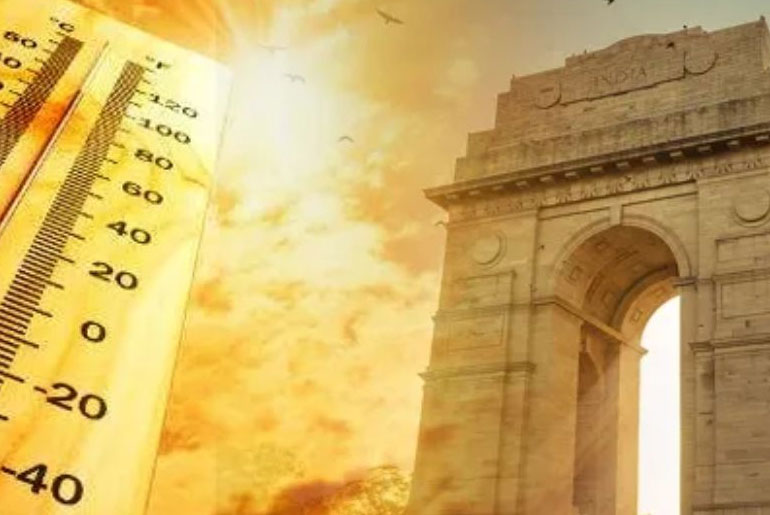A severe heatwave has swept across North India, with temperatures soaring to 45 degrees Celsius and above, prompting the Indian Meteorological Department to issue a red alert for Sunday. As Delhi and other parts of the region grapple with scorching temperatures, it’s imperative to take precautions to prevent heat-related illnesses such as heatstroke and dehydration. Exposure to such high temperatures can wreak havoc on the body, leading to long-term damage to vital organs like the brain, heart, and kidneys.
To mitigate the risks associated with extreme heat, individuals are advised to avoid outdoor activities during peak heat hours and prioritize hydration by consuming water, fruits, vegetables, buttermilk, nimbu paani, and coconut water. The body’s natural ability to regulate temperature can falter at 45 degrees Celsius and above, increasing the likelihood of heatstroke characterized by symptoms such as fever, confusion, dizziness, and seizures. Without prompt medical intervention, heatstroke can be fatal. Therefore, it’s crucial to stay vigilant, recognize the signs of heat-related illnesses, and take immediate steps to cool down the body and replenish lost fluids to avoid potentially life-threatening consequences.
Health Risks Surge in 45 Degrees Heatwave:
- Damage to Brain and Heart: Prolonged exposure to extreme heat can lead to hyperthermia, where the body temperature rises dangerously high. This can result in damage to vital organs such as the brain, heart, kidneys, and muscles, potentially causing long-term health issues or even death if not promptly treated.
- Heat Exhaustion and Heat Stroke: Heat exhaustion, a milder form of heat-related illness, can occur with prolonged exposure to high temperatures. Symptoms include heavy sweating, weakness, dizziness, nausea, headache, and muscle cramps. If not addressed, heat exhaustion can progress to heat stroke, a life-threatening condition characterized by a high body temperature, confusion, rapid pulse, and loss of consciousness. Immediate medical attention is crucial to prevent serious complications or death.
- Dehydration: The body loses water rapidly through sweat in extreme heat, leading to dehydration if not adequately replenished. Signs of dehydration include dry mouth, dark urine, reduced urination, fatigue, and dizziness. Severe dehydration can cause kidney damage, electrolyte imbalances, and shock.
- Cardiovascular Stress: High temperatures put extra stress on the cardiovascular system. Blood vessels dilate, and the heart pumps more vigorously to increase blood flow to the skin’s surface to dissipate heat. This added workload can exacerbate existing heart conditions and increase the risk of heart attacks and strokes, particularly in vulnerable individuals such as those with cardiovascular diseases, the elderly, and those with hypertension.
- Respiratory Problems: Elevated temperatures worsen air quality by increasing the concentration of pollutants like ground-level ozone. Poor air quality combined with heat can irritate the respiratory system, aggravating conditions such as asthma and COPD. Heat also promotes the spread of allergens and particulate matter, further impacting respiratory health.
- Skin Damage: High temperatures and strong sunlight can cause severe skin damage, including sunburn and heat rash. Prolonged exposure increases the risk of skin cancer due to UV radiation. Protecting the skin with appropriate clothing and sunscreen is essential during extreme heat.
Beat the 45+ Degree Heatwave:
- Stay Hydrated: Drinking plenty of water throughout the day, even when not feeling thirsty, helps maintain hydration levels and replace fluids lost through sweating. Avoiding alcohol and caffeine, which can contribute to dehydration, is also crucial.
- Stay Cool: Spending time in air-conditioned environments during peak heat hours provides relief from high temperatures. Additionally, using fans, taking cool showers, and wearing lightweight, loose-fitting clothing help lower body temperature and reduce the risk of heat-related illnesses.
- Avoid Strenuous Activities: Limiting outdoor activities, especially during the hottest parts of the day, prevents excessive heat exposure. If outdoor activities are unavoidable, taking frequent breaks in the shade and staying hydrated can help prevent heat exhaustion and heat stroke.
- Monitor Vulnerable Individuals: Keeping a close watch on vulnerable populations such as the elderly, children, and individuals with chronic health conditions is essential. These groups are more susceptible to heat-related illnesses and may require extra support and attention during extreme heat events.
- Use Sunscreen: Applying a broad-spectrum sunscreen with a high SPF protects the skin from harmful UV rays, reducing the risk of sunburn and skin damage. This measure is particularly important during periods of intense heat and strong sunlight.
By following these preventive measures, individuals can reduce their risk of heat-related health issues and stay safe during extreme heat events. Additionally, staying informed about weather forecasts and heat advisories allows for timely preparation and proactive steps to protect oneself and loved ones from the dangers of extreme heat.
Disclaimer:
The information contained in this article is for educational and informational purposes only and is not intended as a health advice. We would ask you to consult a qualified professional or medical expert to gain additional knowledge before you choose to consume any product or perform any exercise.







